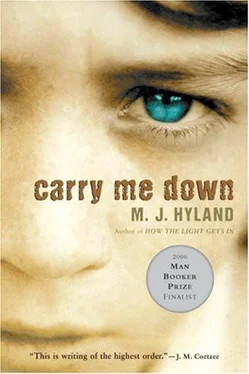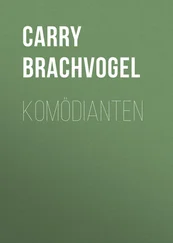A few minutes before the end-of-break bell, the mongoloid boy comes in. His name is Osmond and he spends one day a week here and the other days at the special school in Enniscorthy. Every Tuesday he spends break and lunchtime alone, walking around the playing field, talking, and singing off-key. I’ve never been up close to his droopy face and I’ve never spoken to him.
He stands in the doorway with his mouth open and shifts his weight from one leg to the other, smiling at me, humming, waiting for me to speak. I look away but he comes closer and, when I look up, he is standing by my desk, an inch from my arm. He doesn’t speak, but smiles at me, rocking from one foot to the other. I don’t want him near me.
‘Nice book,’ he says.
He smells of vomit. I don’t want to talk to him. If I’m seen talking to him, it will be as though I am his friend, that I’m the same as him: the two of us lonely. ‘Nice book,’ he says. ‘Nice pictures.’
His spit falls out when he speaks and there’s a glob of it shining on my jumper sleeve. I close the book to stop him looking at Harry Houdini. But he is staring at my food.
‘Nice biscuits. Nice cake. Nice sandwich.’
Could he be hungry? I check my watch: only five minutes until the bell for the end of break.
‘Are you hungry? Do you want some cake? You can take it to your class? Take it to room 3G? Wouldn’t that be good?’
He holds out his fat hand and I put the last of my chocolate cake in his palm. He pushes the cake into his mouth, like a tractor shovelling dirt, and then he closes his mouth, moves his closed lips from side to side and, finally, swallows. He has dissolved the cake in his mouth without chewing. I like that I can stare at him; he lets me stare and doesn’t mind.
‘Nice brown cake,’ he says. His voice is not too spastic, but too loud and it sounds strangled, as though somebody is sitting on his neck.
‘Ssssh,’ I say. ‘Please be quiet.’ My leg is jumping up and down and I put my hand on my knee to stop it.
‘Nice biscuit.’
‘Here,’ I say.
He eats the biscuit by the same method — no chewing — and then he says, ‘Nice book.’
‘You can’t eat the book,’ I say.
I’ve made him laugh and he jumps up and down. ‘Cookie monster! Cookie monster!’
He’s not so stupid. He can say what he wants to and he only wants somebody to say things to. That’s all. But I put my finger against my lip to tell him to be quiet. He looks hurt and walks away. I look at my watch: one more minute before the bell.
‘Look,’ I say. I open the book to the page with the photograph of Harry Houdini in a glass cage, his body covered in thick chains. ‘Harry Houdini,’ I say, quietly. ‘He could do magic.’
‘Magic! Magic makes rabbits.’
‘Can you whisper?’
‘Yes,’ he whispers. ‘Magic makes rabbits.’
‘Yes,’ I say.
‘Magic makes hats and ace of diamonds and no rabbits and rabbits.’
‘Yes,’ I say. I didn’t know he had so many words. If he had a normal face I’d probably want to talk to him. I keep whispering and hope he will too. ‘Do you know what an escape is?’
‘Escape.’
‘Yes. Get out of trouble. Escape from boxes and glass cages.’
He points at Houdini. ‘He escapes from glass jar!’
His voice is loud again, but I don’t mind. He’s right. He understands. I smile at him. Even though his face is droopy, he looks better than I thought he did and he looks better when you are closer to him, paying attention. I thought they all looked like identical twins, but now I see that isn’t true. Osmond has his own nose, his own lips, his own eyes, and his own expressions.
The bell rings and, when it finishes ringing, and we can hear the sounds of people coming down the hall, he says, ‘Nice book.’ His voice is even louder than when he first came to me, as though he thinks the bell is still ringing and he needs to shout to be heard.
‘Sssssh,’ I say.
‘Nice book, nice cake, nice biscuit, nice big boy. Nice John.’ He reaches out to touch my eyes.
‘No!’ I say. ‘Don’t touch! Go away.’
I don’t want him to know my name. No, that’s not right. I do. But I don’t want him to say it. He stops smiling and steps away, backwards. There are tears in his eyes.
‘I go,’ he says.
‘Bye, so,’ I say.
‘I go. I escape backwards. I go out of way of John.’
‘All right,’ I say, and then, even though I haven’t planned it, and even though I think I shouldn’t, I smile again and I say, ‘See you next week.’
He smiles back. ‘Giant biscuit escape backwards from cookie jar.’
I laugh and, when Brendan walks to his desk with Kate, they look at me, and they see that I am laughing and seem to wonder what they have missed. I stare at them until they look away and, when they smirk at each other, I don’t think I care.
When I go to breakfast, nobody is there. My mother has left a note.
Dear John
I’ve gone to the church hall today to help build a set for the school pageant and your Da has gone into town on the early bus. We’ll both see you tonight for tea. Your lunch is on the dresser. Have a good day at school .
Love, Mammy
I decide not to go to school. When they get home I’ll tell them I wasn’t feeling well. I eat some porridge and fried eggs on toast in the living room in front of the fire while watching TV and then I eat some chocolate and two bananas. Crito sits on my lap and together we watch some of a Carry On film set at the seaside and then, at half eleven, I go to my grandmother’s bedroom.
‘Hello,’ I say.
She’s sitting in a recliner by the fireplace, facing the door, and she has her feet up on the empty armchair across from her. She’s not reading or sewing or knitting; just plain sitting. There’s a songbook by her feet so maybe she has been learning new songs to sing for us from the bath.
‘Hello, John. Why aren’t you at school?’
‘I’m sick,’ I say.
‘You don’t look sick.’
‘I am.’
‘Then you should be in bed.’
‘I don’t feel as sick when I’m standing up or sitting.’
Lying like this makes my heart feel squeezed, as though there’s a belt tied around my chest.
‘All the same, if you’re really sick you should be in bed.’
‘I will,’ I say. ‘I just wanted to talk to you.’
‘Why don’t you get the thermometer from the toilet cabinet and we’ll see if you have a temperature?’
‘In a minute. I want to have an important talk first.’
‘Well then, come in and close the door behind you.’
It’s cold, but she has no fire burning. ‘Let me take off my glasses,’ she says, ‘so I can hear better.’
I want to sit in the armchair she has her feet on because I’d rather not sit on her sagging mattress which is stuffed full of horsehair and stinks of wet animal. I stand by the armchair until she moves her feet. I sit.
‘What’s new and exciting?’ she asks.
‘Nothing really,’ I say.
‘Well, aren’t you lovely company? I thought you wanted to chat.’
I clear my throat. ‘Has anybody said anything to do with me and lies?’
‘Have you been caught telling fibs?’
‘No. But has anybody been talking about detecting lies?’
‘No. Should they have?’
‘No. It’s just that I’m reading lots of books about lie detection and I just wondered if anybody had mentioned that.’
‘No.’
‘Can I ask you something else?’
‘Yes.’
‘Has Mam spoken to you about getting money for our trip to Niagara?’
‘No.’
‘Do you know how much it would cost to go to Canada?’
‘What are you after?’ she asks.
Читать дальше












